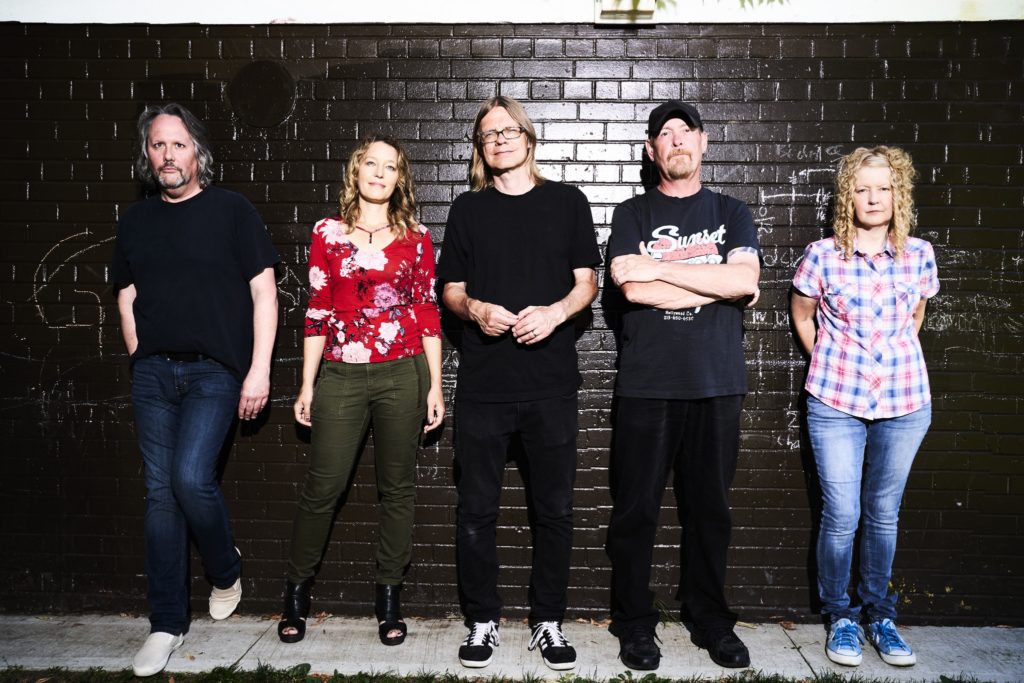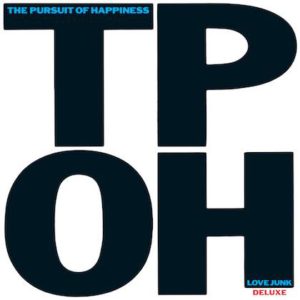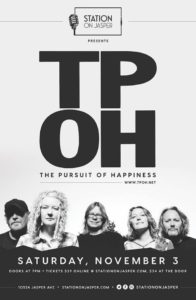
It was one of the most sudden of Canadian success stories, but one that has proved to have a potent and popular legacy. Three decades ago a hard-rockin, somewhat enigmatic and even more delightfully unique power-pop band stormed out of the gates, garnering massive airplay and video play for their debut album. The year was 1988, the band was The Pursuit of Happiness, and the album was Love Junk – and album that continues to garner rave reviews and placement amongst the best releases of that year in retrospectives by reviewers and journalists.
Produced by industry heavyweight Todd Rundgren and released through a top American label, Chrysalis (best known for introducing the world to the likes of Blondie, Huey Lewis and the News, Pat Benatar and Billy Idol) Love Junk was a smash in the band’s home and native land of Canada and led to three more studio albums before the band took a lengthy break starting in 1996.
Earlier this month, Universal Music Canada, released a revamped and remastered 2-disc version of Love Junk, and the band has played several shows to promote it, and has more shows booked over the next weeks and months.
According to the press release from Universal Music announcing the release, “the Love Junk Deluxe Edition will be available on 2CD, 2LP Deluxe and digital versions. The 2CD Deluxe housed in a digipak includes a 24-page booklet and the special 2LP Deluxe edition is housed in a triple gatefold and includes a special 12 x 12 LP sized booklet. The booklets for both editions contains brand new liner notes with interviews from band members past and present, written by David Wild, an Emmy nominated TV writer, best-selling author and a longstanding contributing editor to Rolling Stone. The booklet also includes archival photographs both licensed and from the band’s personal archives, many which have never been seen.”
The biggest hit off the album was the catchy, angsty and brilliantly clever single I’m And Adult Now. Love Junk also featured the hits Hard to Laugh, She’s So Young and Killed by Love. The Pursuit of Happiness was formed in 1985 and went through some lineup change, but at it’s core has always been primary songwriter, frontman and guitarist Moe Berg a native of Edmonton. When the band reunited for some shows in the past few years, he was joined by long-time members Kris Abbott (guitar, backing vocals), band co-founder Dave Gilby (drums, also from Edmonton), vocalist/percussionist Renee Suchy and bassist Brad Barker.
Berg said it has been fun, but also a lot of work to revisit the material from the band’s hit debut album.
“It really was an idea that came from Universal Music, and I thought it was a good idea and was very excited about reissuing the record. But I am not really all that reflective about the anniversary itself, although I think this process has caused me to some degree to be reflective about it because I had to spend time finding tracks and finding memorabilia and stuff like that. It can’t help bring back memories of the time,” he said.
“To me at times it felt like it was more like work. I was trying to unearth all this stuff and find it and I am not particularly organized so a lot of was tough to find the stuff. What is on the second record and the second CD, a lot of it is just from old cassettes and none of it had been digitally fixed or anything like that, which means there are a lot of warts on the second disc, but I think that’s part of what makes it fun.”
After a handful of shows since the band took a hiatus in 1996 (not playing again for almost a decade at first), the offers to see the band live are coming in, thanks in part to the continued popularity of the band’s music, their drawing power and the extra publicity and promotion being generated by the 30th anniversary commemorations for Love Junk. Berg, who struggled with stage fright for many years, began going back on stage occasionally with the band, and with a new Canadian supergroup called the Trans-Canada Highwaymen, which also featured former Barenaked Lady Steven Page, Chris Murphy of Sloan and Craig Northey of The Odds. That conglomeration of talent has toured each of the past two years, allowing Berg to regain his comfort level in live performance situations, but also giving die hard TPOH fans a chance to hear the hits again. He did assert that while more shows may be in the offing, there will never be full blown tours again.

“The Pursuit of Happiness wasn’t particularly active, and I wasn’t unhappy with that necessarily, it was just kind of the way it was. We still don’t really actively try to play more shows. It wasn’t until the fall of last year, when the idea for this record starting to get into gear that we began to play more. It started with a couple of shows in Toronto, where the Horseshoe Tavern was having their 70th anniversary and they were getting a lot of the bands that had played there during the glory days to come back. And we did, and it was really great, and a fun night with a great crowd with lots of people who hadn’t seen us for a long time,” said Berg.
“And just before that we had played in Montreal. This legendary DJ named Tootall [aka Robert Wagenaar] he worked at CHOM FM and he was having a going away party and he wanted to have some of his favourite bands play, so he asked us if we would do that as well. And we had a blast. So, with the new record coming out we let it be known that we were willing to do some shows around that.”
TPOH hit a number of communities on the festival circuit over the summer and after a small release show in Toronto a couple of weeks ago, the band is set for shows in Winnipeg, Vancouver and Edmonton. The band returns to Toronto for a show at the Danforth Music Hall, with their pals The Odds opening, on Jan. 12.
Love Junk came out on the heels of the band signing a major label record deal with Chrysalis Records, based in New York City. And it was primarily on the strength of two independently produced singles and their accompanying videos – I’m An Adult Now, which is still considered to be the band’s biggest and most recognizable hit and Killed by Love. Both were eventually re-recorded and re-released for Love Junk, but it was the songs themselves and the band’s frenetic live show that helped land them the record deal in the first place.
“Releasing those singles and getting the videos out there brought us to some sort of natural attention, but it happened really organically. It’s not like we had some big master plan to conquer the music business. And the attention we were getting just spilt over into the U.S. where people started to take notice of us. When you get noticed, things happen quicker, so we were able to get a manager and an agent and lots of things like that. People were sniffing around our door, curious about signing the band, with all kinds of things like publishing deals and recording deals,” Berg said of the heady days of 1987.
“We signed a deal with EMI Publishing first and that was helpful because they were also trying to help us get a record deal. We talked a bunch of people, mostly on American labels. A guy in the New York office of EMI Publishing gave our demos to a woman named Kate Hymen who was working at Chrysalis Records. She came up to see us on a 40-below winter evening in Winnipeg, Manitoba and signed the band. I guess back then it was a case of labels actually signing bands on their potential, which never really happens today.”
As part of the process of getting signed, Berg and his bandmates also had the opportunity to work with legendary songwriter/singer/producer Todd Rundgren, who played an instrumental role in helping the band solidify and focus its sound – something for which Berg said he is eminently grateful.
“We were in the office of Chrysalis in New York one day and they just kind of flat out asked me, well who do you hear as a producer of this thing. And I said Todd Rundgren – I just kind of blurted it out, because he was my number one choice. He was kind of my idol both as an artist and as a producer. So, I said his name, but then forgot about it right afterwards, and we went on our way back on tour. We played a few more shows and found ourselves back in Winnipeg – which is a very momentous city for us actually – and I got a phone call. I was at sound check and someone had called the bar that we were playing. And it was Todd. I guess Kate had sent him over the demos and he decided he was interested and he called me up and he immediately just started talking about it,” Berg explained.
“It was quite a moment when you think about it, when very unexpectedly your idol just calls you up on the phone and starts talking to you about producing your record. It’s interesting, because he didn’t say a whole lot about what he liked about it; he did say a lot about what he didn’t like about it. So that was more the tenor of the discussion. He thought some of the songs were too twee, as he called them, or too poppy and some others were too heavy. One of the greatest things that Todd did for us as a band is he kind of defined our sound.
 “We gave him like 30 demos and he said, ‘well you don’t do these ones good, you don’t do these good, but all these other ones kind of in the middle here, these are the ones that you do really well.’ Those were the ones we picked to be on the record. And, amazingly, he really did pick the best songs that we had to be on the record. I will say his perception about that was uncanny. And that was very apparent to me as I went over the material again recently to look at stuff for the second disc of the new package. The ones that are on the record are definitely the best ones. And in the studio, I didn’t at all feel pushed into doing anything I didn’t want to do. In the end, I basically agreed with him.”
“We gave him like 30 demos and he said, ‘well you don’t do these ones good, you don’t do these good, but all these other ones kind of in the middle here, these are the ones that you do really well.’ Those were the ones we picked to be on the record. And, amazingly, he really did pick the best songs that we had to be on the record. I will say his perception about that was uncanny. And that was very apparent to me as I went over the material again recently to look at stuff for the second disc of the new package. The ones that are on the record are definitely the best ones. And in the studio, I didn’t at all feel pushed into doing anything I didn’t want to do. In the end, I basically agreed with him.”
The music of The Pursuit of Happiness could be said to fit in a number of genres, although it was most often lumped into the alternative or alt-rock categories. Love Junk came out at a time when there wasn’t a dominant stylistic wind within the Canadian music industry as it later became, coming towards the end of the hair metal days, and just before the rise of what would be called Grunge, or the Seattle Sound. This allowed for a certain independence and quirkiness that is now seen as emblematic of the band’s sound – a sound that definitely set them apart from their contemporaries and which is instantly recognizable to this day.
“I hope it’s not particularly dated. I don’t think there is anything about the sound of the album or the songwriting that ties it to any particular era. Which is helpful. It doesn’t sound so much like it was made in the 1980s. The great thing about the time that we sort of came of age was that there was not sort of a prevailing musical trend at the time. Especially if you think about the Canadian bands that all came out around the same time as us like Blue Rodeo, The Tragically Hip, Northern Pikes, Grapes of Wrath, Cowboy Junkies – none of us sound anything like each other. We all sounded completely different from each other, so there was no sound that everybody was trying to imitate,” Berg said.
“The problem with being readily identified with a type of music is that as soon as that sound goes out of style, then all the bands that tried to have that sound also go out of style. So, I think all the bands that I mentioned kind of benefited from that idea, that there was lot less prevailing musical style to have try to conform to.”
For more information on the Love Junk reissue, and upcoming dates for The Pursuit Of Happiness, follow the band’s social media accounts, including https://www.facebook.com/ThePursuitOfHappinessTPOH.
- Jim Barber is a veteran award-winning journalist and author based in Napanee, ON, who has been writing about music and musicians for a quarter of a century. Besides his journalistic endeavours, he now works as a communications and marketing specialist. Contact him at jimbarberwritingservices@gmail.com.
https://www.youtube.com/watch?v=M64u7i_EemM
SHARE THIS POST:
